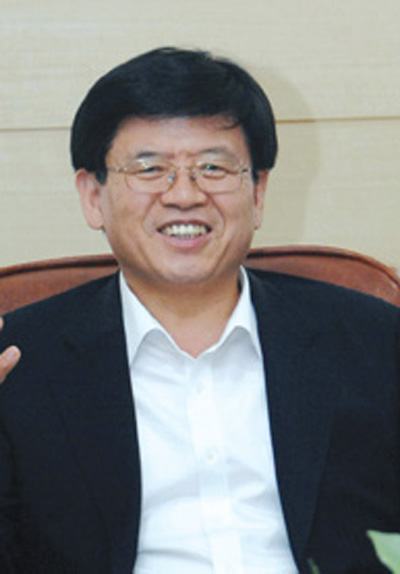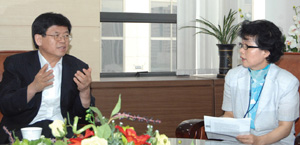10th KOWIN Conference to Take Place for Aug. 29 - Sept.1 in Busan
The conference is held to build and utilize a network of Korean women at home and abroad
 The Ministry of Gender Equality and Family will host the 10th KOWIN Conference in Busan from August 29th to September 1st under the title of ¡®Global Korea and the Role of Korean Women.¡¯ In an effort to develop and utilize the human resource pool of Korean women around the world at a period of globalization, the ministry set up the Korean Women¡¯s International Network (KOWIN) in 2001.
The Ministry of Gender Equality and Family will host the 10th KOWIN Conference in Busan from August 29th to September 1st under the title of ¡®Global Korea and the Role of Korean Women.¡¯ In an effort to develop and utilize the human resource pool of Korean women around the world at a period of globalization, the ministry set up the Korean Women¡¯s International Network (KOWIN) in 2001.
This conference seeks to build and utilize a network of Korean women at home and abroad, reinforcing Korea¡¯s competitiveness, the ministry said. The ministry also aims to strengthen solidarity by encouraging substantive exchanges between Korean women at home and abroad. Finally, the ministry hope to uncover and foster Korean women leaders in all areas around the globe.
The conference will begin with a regional focal points session and a KOWIN review session, succeeded by the opening ceremony and keynote speech on this year¡¯s topic. A special lecture and parallel session will follow, continuing on to a super session and small-group mentoring. There will be various opportunities for networking during the conference, and an cultural experience will be available on the final day.
In this meeting, 500 Korean women, half residing overseas and half at home, are expected to attend. They will be from diverse backgrounds such as the business, education, law, arts, medicine, and journalism sectors.
MGEF Focuses on Multinational Families, Runaway Children
Ministry increases its budget to 300 bln won this year to implement its policies to support women¡¯s roles, multinational families and problem youths
The Ministry of Gender Equality and Family has been working for the improvement of women¡¯s places in society in such areas as education and jobs with a focus on women getting back their jobs after giving birth to children by persuading employers to rehire them. But another pressing problem that has been taking up much of the ministry¡¯s time has been multinational families as Korea gets more internationalized and with more foreign women settling in Korea to make homes with their Korean husbands. The ministry has also been grappling with the problems of single mothers and run-away children for reasons of poverty, which have become a social problem of a large dimension lately.
Following are excerpts of an exclusive written interview between NewsWorld and Vice Minister Kim Kyo-shik of the ministry to unveil what the ministry has been up to in those problematic areas so far.
Question: How large is the budget for the Ministry of Gender Equality and Family for this year?
Answer: It¡¯s been increased to 300 billion won from 100 billion won last year.
Q: What are some of major businesses of the ministry, whose name was changed from the Ministry of Women¡¯s Affairs to the current name?
A: The ministry takes charge of affairs of youth, women and family. In the case of women, the major part of the ministry¡¯s function was to upgrade women¡¯s rights and elevate their positions in society, but now its been changed to help women expand their roles in society and improve environment so that they can marry, have children and get jobs.
Currently, more women go to college than men, while their rates of getting jobs after finishing their education are about the same. But the rates fall dramatically after women get married and have children. They have a hard time returning to their old jobs and or getting new ones. The ministry intends to solve the situation to help women fulfill what they want and at the same time solve the problem of a low birth rate in the country. In the area of youth, the ministry intends to come up with policies for them to develop their talents and influences as well as to return those youths in danger to healthy situations. In the family sector, the ministry plans to the turn the situation around to cut suicide rates, boost the happiness index and reduce divorce rates. With the increase in the number of multinational families, many problems have been occurring and the ministry has been making efforts to take care of those problems, knowing that at the core of these problems is the breakup of families.
The ministry has been trying to take care of these problems with policies to hike the public understanding for the crucial importance of family to individuals, along with plans to help solve the problems of multinational families.
In the case of multinational families, it is crucial for children of these families to be accepted by society, but the problem is the language. They have to learn to speak and read Korean as soon as possible in order for them to enjoy a full association with the native culture and society. Therefore, the ministry has been looking into coming up with solutions for these problems.
Q: What are your plans for solving sexual violence against minors, which has been fast emerging as a serious social issue?
A: The most important matters are the treatment of the victims and their families and the prevention of these types of crimes from occurring. We have to strengthen the punishment for those crimes and make the criminals to wear the rings in their arms.
Q: There currently are 6,000 sex offenders. Did the draft bill for sex offenders against children get the parliamentary approval yet?
A: The bill for disclosing sex offenders on the Internet got the parliamentary approval. Anyone over 21 years old can visit the site for sexual offenders to know the whereabouts of these criminals, the types of sexual crimes they committed and their physical appearance.
Q: It looks as though the disclosure would have a great social impact.
A: The United States already has such sites and quite a number of people visit the sites. The number of disclosed criminal is small and I hope it will remain that away forever.
Q: As mentioned above, are measures to solve women¡¯s problems expected grow to become a social movement?
A: We developed a policy allowing women to both work and manage their homes at the same time through a flexible work schedule and encourage companies to use them. The flexible work schedule includes shortened office working hours, work at home and remote work, and companies can choose any one of the work schedules that fit into their operations. The ministry has been encouraging short work hours of 25 hours per week down from the usual 40 hours per week.
Currently, about 20 government organizations have been using them on a trial basis and we plan to make a standard model next year. These types of office work schedules for women have been adopted in Europe since the 1870s and many advanced countries have been using them. Women¡¯s participation in society has been rising, helped by the shorter working-hour system and birth rates have also been increasing, as there is no need to hold off on marriage and child birth, which has a very good impact in solving labor shortages and promoting economic growth.
Q: Were there any revisions to the law?
A: No revisions have been made to the law so far. But the public servant employment decree has been changed to allow first-year short working hour experiences for employment candidates. What is more crucial for the success of the flexible working system is whether CEOs will accept the system, recognizing the importance of the system for their companies and society.
The ministry plans to hold workshops and lecture presentations at the Chamber of Commerce and Industry in Seoul to expand the system around the country. The ministry has decided to fix a number of lecturers and other programs to urge more companies to take up the flexible work-hour system, while the CCI will take care of news releases for broadcasting and printing.
Q: Can you update us about the policies to help multicultural families in Korea?
A: Many social organizations including businesses and media have been participating in the efforts to help those families settle in Korea, not only for foreign women who are married to Korean husbands but more importantly to children of mixed blood and those who came to Korea with their mothers.
Q: What have been some of your plans to help the children to who came to Korea with their mothers who are married to Korean husbands to settle in Korea?
A: Regional governments have been extending their hands to help those kids and I myself have signed a sisterhood relationship with a Mongolian girl and have been meeting with her often to find more about the girls in the same situation as her, sometimes sharing meals together.
Q: What are some of the things that the ministry plans to do for the multinational families besides what you have mentioned so far?
A: I visited a number of facilities for unmarried mothers and found that most of them quit school and were kicked out of their homes, although they were students. We found one of the children was ill and we collected 2 million won from our pockets and gave the money to the mother of the sick child for medical care. They need all kinds of help when you take a look at each one of them.
Q: What about youths in crisis?
A: The problems for those children who bolted out of their homes for economic reasons are more severe than those children who committed crimes. Those children live in government-supported facilities around the country, but the facilities are dilapidated and residents nearby those facilities want them to be moved to elsewhere. But the ministry plans to build more such facilities and education institutes for those children. nw
Vice Minister Kim Kyo-shik of the Ministry of Gender Equality and Family
Vice Minister Kim Kyo-shik of the Ministry of Gender Equality and Family holding an interview with NewsWorld Publisher and President Elizabeth M. Oh.
3Fl, 292-47, Shindang 6-dong, Chung-gu, Seoul, Korea 100-456
Tel : 82-2-2235-6114 / Fax : 82-2-2235-0799